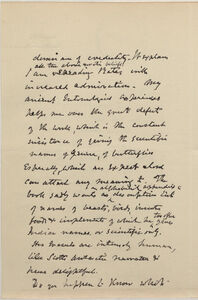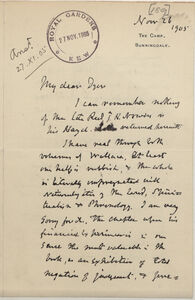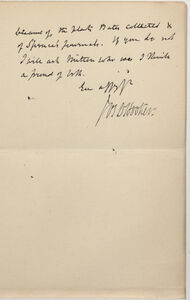Transcript
dominance of credulity. It explains all the above erratic beliefs!
I am rereading Bates*5 with increased admiration. My ancient Entomological experiences helps me over the great defect of the work, which is the constant insistence of giving the scientific names of genera, of butterflies especially, which an expert alone can attach any meaning to. The book sadly wants as an alphabetical appendix a descriptive list of names of beasts, birds, insects, foods & implements of which he too often gives Indian names, or scientific only. His travels[?] are intensely human, like Scotts Antarctic narration & hence delightful.
Do you happen to know what
THE CAMP,*1
SUNNINGDALE.
Nov[ember] 26 1905*2
My dear Dyer*3
I can remember nothing of the late Rev[eren]d J. H. Newby[?] or his Hazel. Letter returned herewith.
I have read through both volumes of Wallace.*4 At least one half is rubbish, & the whole is literally impregnated with Nationalization of the land, Spiritualism & Phrenology. I am very sorry for it. The chapter upon his financial experience is in one sense the most valuable in the book, as an exhibition of total negation of judgement, & pre--
dominance of credulity. It explains all the above erratic beliefs!
I am rereading Bates*5 with increased admiration. My ancient Entomological experiences helps me over the great defect of the work, which is the constant insistence of giving the scientific names of genera, of butterflies especially, which an expert alone can attach any meaning to. The book sadly wants as an alphabetical appendix a descriptive list of names of beasts, birds, insects, foods & implements of which he too often gives Indian names, or scientific only. His travels[?] are intensely human, like Scotts Antarctic narration & hence delightful.
Do you happen to know what
became of the plants Bates collected & of Spencer's*6 Journals. If you do not I will ask Mitten*7 who was I think a friend of both.
Ever aff[ectionatel]y your | Jos D Hooker [signature]
1. Joseph Hooker had a residence built in Sunningdale, Berkshire called 'The Camp'. Completed in 1882 he lived there full time, with his second wife Hyacinth and their family, after retiring from RBG Kew in 1885.
2. This letter is stamped as received at the Royal Gardens, Kew, on 27 Nov. 1905. An annotation by hand records that it was ans[were]d 27. XI . 05
3. Sir William Turner Thiselton-Dyer (1843--1928). British botanist and third Director of the Royal Botanic Gardens, Kew (1885 -- 1905). He succeeded Joseph Hooker in the role after serving as his Assistant Director for ten years. He previously held professorships at the Royal Agricultural College, Cirencester, Royal College of Science for Ireland and the Royal Horticultural Society. He married Hooker's eldest daughter Harriet in 1877.
4. Wallace, Alfred Russell (1905), My Life; A Record of Events and Opinions.
Alfred Russel Wallace (1823--1913) was a British naturalist, explorer, geographer, anthropologist and biologist who independently conceived the theory of evolution. Strongly attracted to unconventional ideas such as spiritualism, he was also a social activist and one of the first scientists to raise concerns over the environmental impact of human activity.
5. Henry Walter Bates (1825--1892). English naturalist and explorer who gave the first scientific account of mimicry in animals. He made an expedition to the Amazon rainforests with Alfred Russel Wallace starting in 1848. From 1868--69 and again in 1878 he was the President of the Entomological Society of London. Hooker is possibly referring here to Bates' book The Naturalist on the River Amazon.
6. Herbert Spencer (1820--1903). English philosopher, biologist, anthropologist and sociologist who was an early advocate of the theory of evolution. He promoted the pre-eminence of the individual over society and of science over religion.
7. William Mitten (1819--1906). English pharmaceutical chemist and authority on bryophytes (mosses, lichens and liverworts). His daughter was married to Alfred Russel Wallace.
Please note that work on this transcript is ongoing. Users are advised to study electronic image(s) of this document where possible.
Powered by Aetopia


